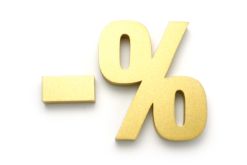The latest intel from Canada’s mortgage market…
Tanker Attack Torpedoes Rates

There were sparks this week in the powder keg that is the Middle East. Sea terrorism triggered fears of war and/or oil supply disruption. That led investors to pile back into “safe” Canadian government bonds.
As is usual when the market goes into “risk-off” mode, bond prices rose and yields sank (the two always move in opposite directions). The mortgage industry’s go-to indicator, the 5-year government yield, gave back its gains from Monday/Tuesday and ended the week 2 bps lower.
Troubling events that come out of left field always have the potential to change rate direction near-term. How much this particular attack ultimately weighs on rates depends on how much it escalates. At the very least, it’ll add to the heap of other economic anxieties: recession risk, trade, Fed-cut worries and so on.
5-year Rates at a 22-Month Low

Fixed 5-year mortgage rates cracked 2.50% on Friday for the first time since September 2017. Albeit, only default-insured mortgages qualify for that rate so far.
Canada’s best 5-year fixed rates on refinances and lender switches are 20+ bps higher (2.69%+) and dominated by HSBC and deep-discount online brokers.
For fixed rates to drop meaningfully from here, the 5-year bond yield must close below 1.25%.
Beat the Stress Test at 3.29%
 Declined by a bank because your debt ratios are too high to pass the stress test? Ontario credit unions have the answer. A few now qualify borrowers at just 3.29%. In other words, they make you prove you can afford a 5-year fixed payment based on your actual rate (3.29%). That’s how all lenders used to qualify borrowers pre-2018.
Declined by a bank because your debt ratios are too high to pass the stress test? Ontario credit unions have the answer. A few now qualify borrowers at just 3.29%. In other words, they make you prove you can afford a 5-year fixed payment based on your actual rate (3.29%). That’s how all lenders used to qualify borrowers pre-2018.
Compare 3.29% to the 5.34%+ qualification rate used by the big banks. For someone making $100,000 a year with no debt, that’s the difference between being able to buy a $723,000 house versus a $593,000 house.
For this privilege, you need 20%+ equity. And the rate is roughly 40 basis points higher than for someone who qualifies under the federal stress test. But that’s a lot lower than a non-prime lender.
Cheaper Insurance Lowers Low-ratio Rates
Rates have noticeably improved on insurable mortgages with 25-35%+ equity. Part of the reason is better portfolio (a.k.a., “bulk”) insurance pricing from default insurers. Many lenders must buy this insurance to reduce their lending costs.
CMHC cut some of its bulk insurance premiums on April 1. Lenders tell us that Canada’s two private insurers also cut their bulk premiums this year.
“Based on 2018 trends, which indicate a gradual improvement in the quality of business being submitted for portfolio insurance, we expect the revised premium structure to lead to a lower average premium rate for portfolio insurance,” CMHC says.
Lower loan-to-values (LTVs), a shorter amortization period, larger mortgage sizes and more “seasoned” loans (i.e., mortgages that have performed well for a long time) can all lower default insurance premiums for a lender, CMHC adds. And some lenders are passing along those savings to consumers.
More Rate & Housing Reads
- “We know it’s going to be 15-20 years before it’s one click to buy a home,” said the CEO of U.S. mortgage fintech Better Mortgage
- This is coming from a guy whose stated goal was: “no customer interaction [with humans] whatsoever…”
- Not everyone is buying the concept of Islamic “mortgages”
- Beware oil over-supply. It’s interest rate bearish for an economy—like ours—that’s so reliant on petro-investment.

 log in
log in

4 Comments
So banks have to apply the stress test and credit unions do not have to apply the stress test. But what about all the online lenders that are listed on your best mortgage rates page? Are they considered banks?
Hi Bill,
In most provinces, credit unions don’t have to apply the federal stress test since they are provincially regulated. But many do. And some provinces (e.g., Quebec) are exceptions and the stress test is imposed there by all institutional lenders (banks and caisses).
The lowest online rates are almost exclusively from federally regulated sources, so the stress test almost always applies.
Cheers
Does it means now its a good time to get into fixed rate or there is a change they go down a bit more?
Fixed rates are still dropping and will continue to do so most likely.